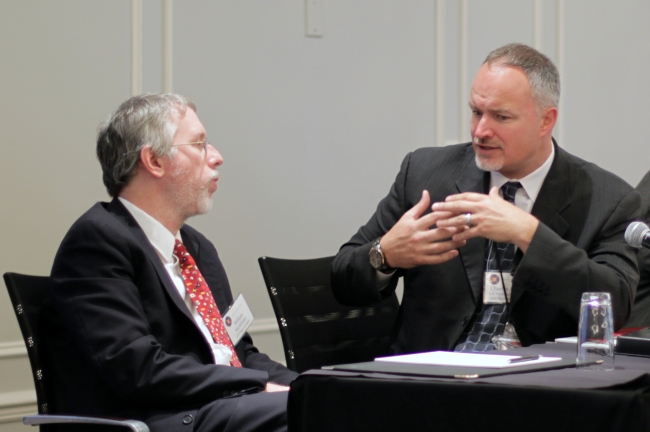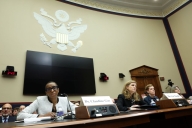You have /5 articles left.
Sign up for a free account or log in.

William B. McAllister and Charles A. Barth chat during the Association of Research Libraries fall conference.
Inside Higher Ed
WASHINGTON -- University libraries need to advocate for government openness and electronic record keeping, speakers during the Association of Research Libraries fall membership conference implored on Wednesday, or risk the digital landscape's becoming a “digital landfill.”
The call to action emerged from a day during which members of the association debated how libraries should involve themselves in producing accessible digital resources, managing institutional data and supporting campus innovation. Speakers, among them archivists, legal experts, federal workers and university librarians, urged a more proactive role that included advocacy beyond the boundaries of their institutions.
Specifically, the speakers said, organizations such as the ARL and others could serve as watchdogs to ensure the activities of the government are recorded electronically and not stowed away in the depths of a filing cabinet.
“When government doesn’t keep its own records well enough, it’s fundamentally corrosive to people’s faith in government,” said William B. McAllister, director of special projects in the U.S. Department of State’s Office of the Historian, who stressed that he was sharing his own views, not the government’s. “If you don’t have somebody ensuring accountability, then you’re almost always going to have a problem.... I would pressure [the ARL] to consider advocacy and creating consortia with other groups that are interested in these issues to see if you can get a place at the table when the specs are made in the first place.”
The ARL, a nonprofit with representatives from about 125 academic and research libraries in the U.S. and Canada, hosts conferences twice a year for its members to share ideas such as the ones presented here on Wednesday.
McAllister and others framed the issue of outdated record keeping in terms of numbers, pointing to the “immeasurable” quantities of data being produced by government agencies in the U.S. and abroad. Yet as the number of records has increased, the number of people tasked to archive them has decreased. Since the 1950s, McAllister said, the number of federal clerical staffers in the U.S. has shrunk by 90 percent. Additionally, many of the records are incomplete.
“Let me put it to you this way: If I as a historian were to come 30 years from now to your institution, and I wanted to find out what you did in your job, and what I had to look at was the records your boss kept about you, would I get a very accurate picture of what you do? Probably not,” McAllister said. “That’s the extent of the problem and some of the structural, built-in issues that have developed into the situation that we have today.”
Charles A. Barth, director of the Federal Register for the U.S. National Archives and Records Administration, or NARA, said the agency stores 12 billion pages of paper records. On top of that, the agency also maintains 500 terabytes of electronic records, which translates to almost 2.3 billion books of 200 pages each.
Still, Barth said “We are really and truly just getting started in this game."
NARA is seeing “exponential growth” in the number of electronic records being created, said Barth, who estimated that 90 percent of the agency’s records will be digital within 20 years.
That growth can be seen in the email records produced by the last five presidential administrations. Thomas S. Blanton, executive director of the National Security Archive at George Washington University, said the archive has saved about 250,000 emails from the Reagan administration, 450,000 from the first Bush administration, 32 million from the Clinton administration and 220 million from the second Bush administration.
Barth added that the Obama administration will produce at least 1 billion emails and tweets, which will all be archived.
The staggering volume of records, Blanton said, makes electronic record keeping all the more important.
“There is no way that any presidential historian in the future is going to be able to read all of them -- no way,” Blanton said. “But they are going to be able to sort them, search them, use algorithms, and so the challenge here is to keep them digital, not print and file.”
NARA, he said, should ideally serve as the “back-up hard drive at moment of creation” for electronic records.
The agency is in the process of moving in that direction. In 2011, it hired its first chief records officer, and by 2019, Barth said, all government records will be handled electronically.
Until then, Blanton warned, historians and researchers face years of digitizing old records.
“We also need ... to push back against the places where the government is not keeping the records, to push back against old ideas of print and file -- and support the curation efforts, support the advocacy efforts, support the litigation efforts,” Blanton said. “Push the government, because the government doesn’t lack for resources to do this right, but they have to be moved.”








